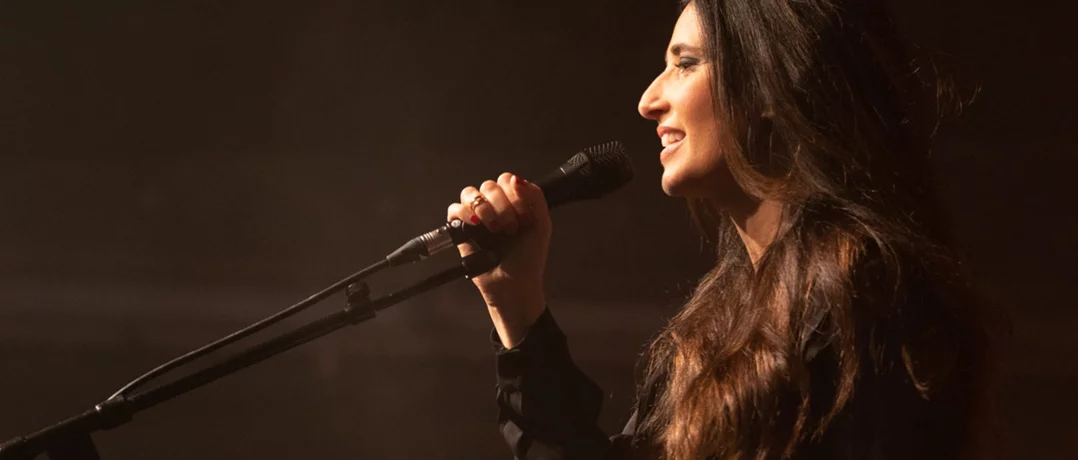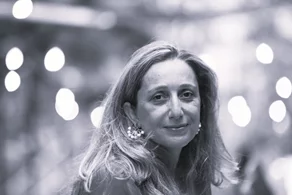Yara Lapidus returns home: first concert in Lebanon after a life in exile
Yara Lapidus returns home: first concert in Lebanon after a life in exile


This Saturday, singer-songwriter Yara Lapidus will perform for the first time in her homeland, Lebanon. The intimate concert at Metro al Madina will mark her long-awaited encounter with a Lebanese audience.
Known for her delicate reinterpretations of David Bowie and John Lennon in Arabic, Lapidus speaks, to the Beiruter, of her anticipation:
I always get stage fright— that’s normal. But in Lebanon, it’s a different kind of anxiety and anticipation
Yara Youwakim left Lebanon for good at the age of 18, while the 1975–1990 civil war was still ongoing. She moved to France to study fashion design. She also attended acting classes at Cours Florent and the Pygmalion Studio, while continuing to write poetry.
At 20, she entered the world oh haute couture working as Oscar de la Renta’s assistant at Balmain, before launching her own line,Y by Yara, which was sold at the time in all Victoire boutiques in Paris. She was also the first to launch a high-end line of jeans with Chinese embroidery inspired by vintage kimonos.
She worked for Olivier Lapidus, whom she would marry in 1997.
She recalls that final journey, at 18, which led her into exile.
“It started on a small boat, like so many Lebanese experienced. In the darkness of the Jounieh port, which had to remain unlit for fear of being spotted. The crossing took us to Cyprus. We all had the same blank stare. Families torn apart, scattered. My father in one place, my mother left behind under the bombs, and us, tossed into an uncertain future. It’s a strange feeling — to leave in order to survive, but leave a piece of yourself behind,” she says.
She continues: “As a child, I thought the most painful thing was facing death — three times, before I turned eighteen. But the real heartbreak was the final departure. The one where you realize that this time, it’s for good, it’s a one-way trip, no longer a round-trip. I left my homeland, my friends, my family — I was almost kicked out.”
Of course, I dreamed of Paris, of fashion, but I would have preferred to have leaving as a choice, not a brutal expulsion
And I still wonder: do we ever really choose the moment when everything changes?” she asks.
Her life was shaken again in 2010. After a surgical operation, she lost the use of her left hand, stepped away from her career as a designer, and devoted herself to music.
“What could have been an ending became a beginning. As if life, through a violent detour, had brought me back to the essential: writing, voice. I didn’t choose singing as a career — it chose me. It became a necessity. As if the emotions I had poured into fashion now needed another space — that of words and music,” she reflects.
She speaks again of her childhood: “I grew up in a family of artists — a mother who painted and played the guitar, a father who was an architect and sculptor, a music lover. Music was already with me — first the guitar, then the piano — but early on, two passions stood out: the stage and fashion.”
Yara Lapidus, who released her first album in 2009, has worked with major names in music, including Gabriel Yared and later Bachar Mar-Khalifé. But more importantly, she is committed to Lebanon. In response to the economic crisis and the Beirut port explosion, she has been involved in fundraising efforts, notably for the Lebanese Red Cross.
“Lebanon isn’t just a connection. It’s a certainty. Everything brings me back to it — my family, my friends, my heart. I return often — every three months, sometimes — to be with my loved ones, to reconnect with my roots. Each trip is like a breath of fresh air. A way to stay connected to what shaped me. What I miss is never having known it in its prosperous times. That ‘Switzerland of the Middle East’ my parents spoke of — even strangers I meet while traveling still mention it. Like a lost paradise. An idealized country. Carrying nostalgia for a homeland you’ve never known in peace — that’s a cruel burden. So, I bring it back to life in my songs. Not as a memory, but as a promise.”


